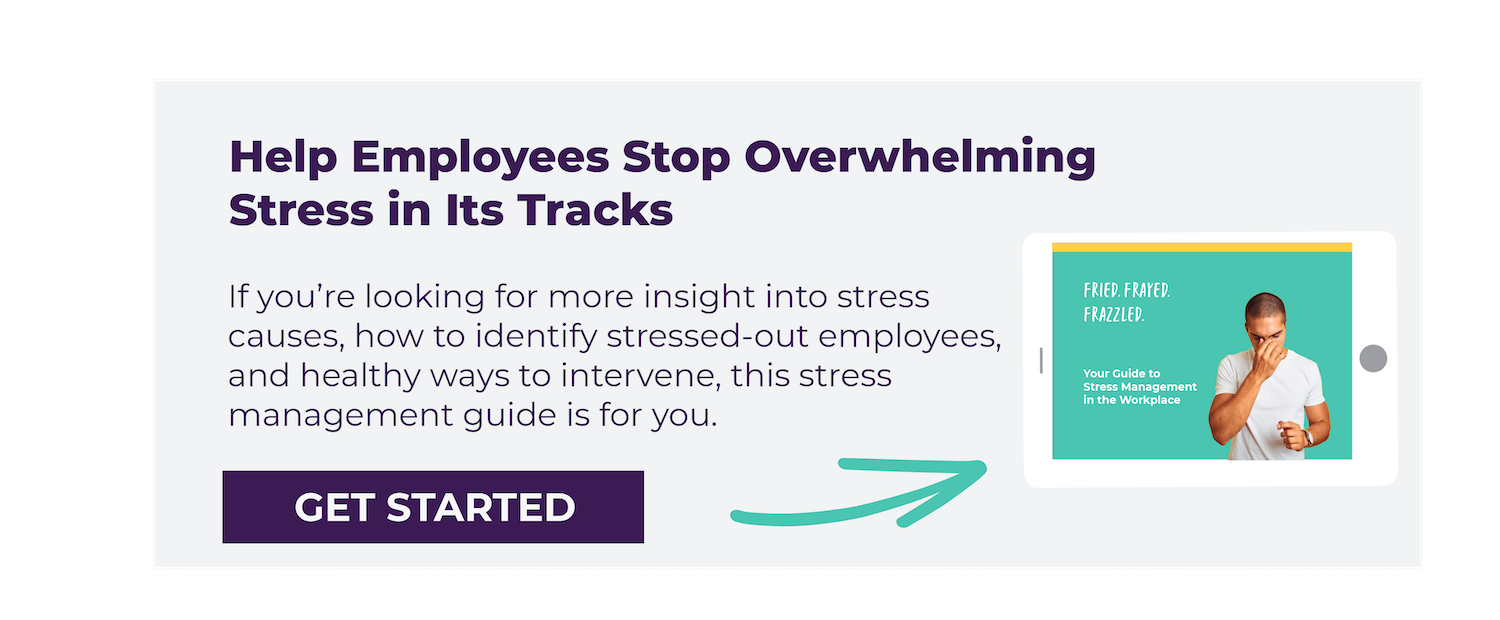 What does stress management in the workplace look like at your company? Stress in and of itself isn’t bad, but when it’s chronic, that’s when the problems begin.
What does stress management in the workplace look like at your company? Stress in and of itself isn’t bad, but when it’s chronic, that’s when the problems begin.
When the body is under too much stress, it can cause:
- Anxiety
- Headaches
- Depression
- Digestive issues
- High blood pressure
- Bodily inflammation
- Coronary artery disease
And that’s just the short list.
Recent research indicates more Americans are continuously distressed, thanks in part to the pandemic. Even simple decisions are becoming more difficult to make, states the recent American Psychological Association's "Stress in America'' survey. It found that 32 percent of adults have been so stressed by the pandemic, that they sometimes wrestle with daily tasks like choosing what to wear.
Managers have a duty to ensure their team works productively, but not to the point of a stressful breakdown. Encouraging workers to take steps to manage stress appropriately not only helps them in the short-term, it provides a healthy way for them to cope with ongoing life stressors. It will also create a more sound workforce.
Want to help minimize workplace stress and help your employees copy in a healthy way? Here are 11 easy tips both management and employees can benefit from — any day of the week.
1. Take a Break
As simple as it sounds, it can be difficult for workaholics and the easily stressed to skip work breaks. But it’s one of the simplest ways to reset the brain and body. Not only does it give you a mental break, but it also provides rest for your body. For example, your eyes can avoid eye strain from a computer and your back can get a good stretch during a short walk away from your office.
Prime time to try it: If a task is stressing you out, walk away and take a breather.
2. Slow Down With an Activity
Even in the work environment, you can find simple ways for stress management in the workplace that are discreet. No one needs to know you’re a ball of nerves! Consider trying activities that feel calming to you.
A few ideas to try:
- Grab a coloring book and get coloring
- Head out for a brisk walk outdoors
- Listen to nature sounds in your headphones
- Squeeze calming adult playdough (like a calming lavender scented dough!)
3. Avoid Stress Before It Hits
Sometimes, you do indeed have control over how stressful a particular situation or event may be in your life. There are a variety of ways to reduce and sometimes avoid undue stress.
Instances may include:
- Giving a speech
- Preparing for a party
- Scheduling work travel
- Getting ready for a vacation
In each of the above examples, there are multiple ways to reduce the stress involved.
In giving a speech, you would want to thoroughly prepare and recite your key points. You may even organize notecards. Preparing a work party? Start writing to-do lists and planning. Getting ready for a long work trip? Pull out those to-do lists and your suitcase and get organized with packing days before (not the day of). Vacationing? Start mentally and physically preparing your work schedule to alleviate the stress before and after.
Prime time to try it: The key in all of these? Preparing and doing what you can to cut the stress response down in the moment.
4. Try a Brain Dump
If overthinking tends to lead to anxiety for you, then you know how stressful it can be when you’re trying to manage all your to-do items in your head. The brain dump method is a simple way to manage your anxiety and overthinking in a quick activity. Grab a pen and paper and write down everything floating in your head. Like cleaning out your super disorganized closet, you’ll find you can access your “brain files” much easier when your brain feels less overwhelmed.
Prime time to try it: Whenever you have a lot on your schedule or have recently been given a lot of information to process.
5. Do Some Meditative Breathing
Deep breathing is an excellent way to recenter your mind and energize your body. If you can find a calm, quiet place to do your breathing (even shutting your office door is fine), you’ll be able to better experience the calming effects.
Explore meditative breathing by:
- Finding a quiet place
- Closing your eyes
- Breathing in through your nose
- Placing a hand on your stomach, breathe out of your mouth
- Notice how your belly rises up and down
- Take several full breaths in and out to experience calm
Prime time to try it: Aim to do it a few times a day for a few minutes at a time. Even if you’re not stressed, it can act as a preventative mindfulness practice that reminds you to breathe deeply during times of high stress.
6. Unplug
Do you feel constantly tethered to your phone? Or anxious you’ll miss a notification if you leave your phone in another room? When you take the time to unplug, you can reduce stress nearly immediately. It also allows you to focus on the people and relationships in front of you fully. Want to be more productive? Shut your phone down and put it out of sight. One study found people who kept their phones nearby were still distracted by them. At work, keep it away in your drawer or in another location.
Prime time to try it: Try to do so fully once a week (when you’re off work, for example), and watch how you benefit from being unplugged from electronics.
7. Countdown
Ready to kick your anxiety and stress? You can literally count it down. In doing so, you will feel more control and have a simple method to nix rising anxiety. The grounding technique of counting down from five is easy to remember and do.
When stress hits, try this 5-4-3-2-1 method:
- Five - Look for five things you can see
- Four - Name four things you can physically feel
- Three - Find three things you can hear
- Two - List two things you can smell
- One - What do you taste? Or, imagine tasting your favorite meal
Prime time to try it: Whenever you need to minimize anxious or overwhelming feelings (in a crowded elevator, on deadline day, before a big presentation, etc.) and want to feel yourself being recentered.
8. Talk to Your Supervisor
Feeling far too overwhelmed by your workload? Let your boss know! You can’t get the help you need if no one knows you’re suffering. Whether you feel like you need a mental day off or your workload is too much, let your immediate supervisor know.
Prime time to try it: If you feel work stress building up and not getting better, talk to your supervisor sooner rather than later. They can get you the tools or resources you need.
9. Give Yourself a Pep Talk
There’s no denying the person who most gets in your head is you. If you’re filling your mind with negative self-talk, you could be further adding to your stress levels (while simultaneously damaging your self-esteem). Positive self-talk will help you stay calm and figure out solutions sooner. It takes practice, but is worth persevering at no matter what situation you’re in.
Ways to practice positive self-talk might include:
- Instead of: “I feel helpless and alone,” tell yourself: “I can reach out and get help if I need it.”
- Instead of telling yourself, “That was a stupid mistake on my part,” you can say, “I did the best in the moment and can do my best to correct the mistake.”
- Instead of “I can’t do this,” aim to say, “It looks hard, but I’ll try and do my best.”
Prime time to try it: During your morning commute, heading into a staff meeting, before turning in a project — these are all ideal times to give yourself a positive pep talk.
10. Go Home On Time
Sticking to allotted work hours can be challenging in an era of staff shortages and company cutbacks. But going home when work is over — and leaving work tasks at work — allows for a full reset and recharge. In doing so, you’ll clear your head and can invest in activities you enjoy outside of work. Managers, it’s essential to follow this as well. If you don’t, other employees may feel obligated to stay late, work overtime, and experience burnout.
Prime time to try it: Create a list of essential to-do items at the start of the day. Tackle the most important and once you get to the last hour of work, watch your time and what you can reasonably wrap-up. Once it’s time to clock out, really do so. This is also good to try when you’re tempted to tackle “just one more thing” and you have less than 15 minutes left at work.
11. Eat Well
When you eat junk food and less-balanced meals, you probably feel sluggish, exhausted, and bloated. But when you eat well (however that looks for you), you likely feel energized and like you can take on the world, right? A healthy diet will keep your mood elevated and give you the energy you need to tackle work and life. If you’re eating poorly, it’s bound to bring down your mood, delay your cognitive skills, and leave you feeling drained.
Tips that may help:
- Limit caffeine - If you tend to get jumpy or too wired after consuming caffeine, consider cutting back. Too much caffeine can increase anxiety levels, and, therefore, stress levels.
- Skip stress eating - Can’t walk past the work candy bowl without grabbing a handful of candy? Time to find a new route through the office. Stress eating can lead to added pounds and guilt. Instead, opt for other stress-relieving activities.
- Keep healthy items on hand - If you know you’re a sucker for that 3 p.m. vending machine candy bar, keep another healthy snack on hand. Mixed nuts, fresh fruit, half of an avocado, and the like will keep you satisfied without the sugar rush and crash.
Prime time to try it: Daily, of course. But if you can stick to the 80/20 rule — eat well 80% of the time and do your best with the leftover 20% — you’ll likely make it an ongoing lifestyle choice.
Take Charge of Stress Management in the Workplace
The above list is a starting point for employees to take charge of stress at work.
As leaders, it’s essential to listen to employee feedback and act upon it. Doing so can help create a less stressful environment. Making work less stressful and more engaging for your team doesn’t have to be overwhelming. “Listening” indirectly and watching and identifying overworked, stressed employees can also provide solutions to your workforce sooner, too.
The happier and healthier your employees, the more they’ll get done. That starts with ensuring they have what they need to get the job done and also have ways to blow off steam, if needed.
Consider the variety of ways you can encourage your team to decompress (even on the job) so they don’t get too overwhelmed. Burnout is a messy, unappealing process for workers and the workplace. Don’t let it get to that point. Take the time to set-up safeguards from stress, and you’ll see employees feeling more at ease and happy to come to work.
Want more pointers and resources on tackling stress management in the workplace? Check out our newest free downloadable toolkit below!



